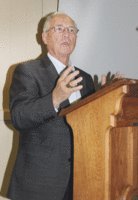 Palmerston North
Palmerston North
Bishop Emeritus Peter Cullinane
29 November 2012
Plain, old-fashioned greed is at the root of much of the earth’s destruction, says emeritus Bishop of Palmerston North Bishop Peter Cullinane, citing the way rents in Christchurch rose 15 percent after the earthquake.
Bishop Peter told an ecumenical conference – ‘Christianity and the Ecological Crisis: Lament, Hope, Action’ – at St John’s in the City, Wellington in October that the accommodation had not changed, but the need for accommodation grew and the rising cost became ‘somewhat like a surcharge added to the cost of the commodity or service being exchanged.
‘Can we charge people for something that is already theirs, namely their need?
‘Today we get around it by deeming the value of goods and services to be measured partly by “supply and demand”.
‘We even manipulate the supply to increase the demand and the price.
Bishop Peter said he was sure this widened the ‘social and economic gap between those who can better afford and those who cannot’.
Greed, he told the 150 people gathered from around the country, drives people to exploit the planet’s resources beyond the minimum necessary for meeting human needs and to the maximum possible for maximising profits.
Bishop Peter couched his comments in a reference to noted economist EF Schumacher’s observations in 1975 that Britain’s economic recovery under current thinking would be hindered by the already emerging ‘crisis of resources, the ecological crisis and the social crisis’.
Three illusions dominated thinking – that of an inexhaustible supply of cheap fuels and raw materials, of a cheap and almost inexhaustible supply of workers willing to do soul-destroying work and the idea that science and technology would make us all rich.
The recent banking crisis shows that we do not learn.
Where ‘deep surgery’ was needed, attempts were made to repair the existing systems so that business as usual could resume.
In New Zealand, some economic planners tend to think of social and ecological impacts as a kind of collateral damage to be addressed once the economy is fixed.
But Bishop Peter said we need ‘integrated social, economic and ecological planning’.
‘I am under no illusion about the difficulties, the main one being that what has not gone away is the underlying spiritual, moral crisis at the root of which is greed.’
Quoting from Pope Paul VI’s 1975 Letter on Evangelisation, ‘there can be no new humanity if there are not first of all new persons’, Bishop Peter said this meant conversion.
‘It involves a turning from current self-centred attitudes and lifestyles’ and a ‘turning to’ which for Christians means ‘deepening our relationship with Christ’.
Drawing on a statement from Pope John Paul II and the Patriarch of Constantinople on the links between the economic, the social and the ecological with the moral and spiritual, Bishop Peter said these deep connections ‘have to do with how much we respect human dignity – our own and that of others.
The environmental crisis did not start with the environment
‘Not all “natural” disasters are natural.
‘The crisis starts in human hearts. It results from the kind of economies we build.
‘The environment cannot be isolated from our human activities.’
John Paul II and the Patriarch suggested the way out of the crisis called for ‘a change in the way we think and act’.
Bishop Peter said we live on the threshold of new opportunities for genuinely ethical approaches.He proposed building or strengthening consensus within three (overlapping) ‘communities of interest’:
• those who accept the economic good sense of taking a more responsible attitude in our treatment of the planet’s resources;
• those who accept that human development cannot be reduced to any one of its aspects – it is either holistic or it is not truly human; and
• those who draw on the Judeo-Christian tradition to know what it means to be truly human and who discover that we can be ourselves only by being for others in every aspect of our lives.
‘It is a way of being that runs counter to the core problem of greed.
‘Galvanising these areas of consensus constitutes … a strategy that should have both moral and political consequences.’
Image: Bishop Emeritus Peter Cullinane addresses the ecumenical conference ‘Christianity and the Ecological Crisis: Lament, Hope, Action’ at St John’s in the City in October.
The full text of Bishop Peter’s address can be read on the Diocese of Palmerston North’s web site.